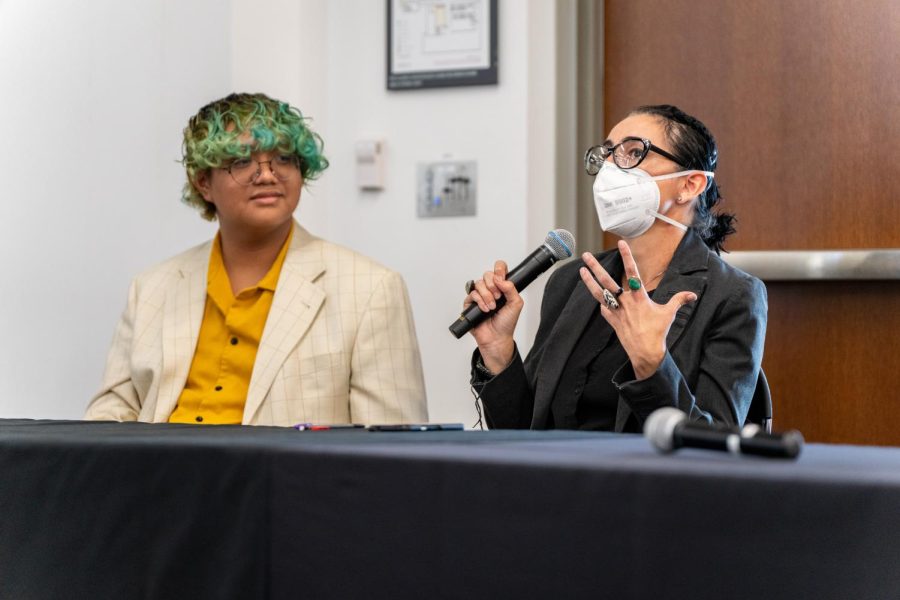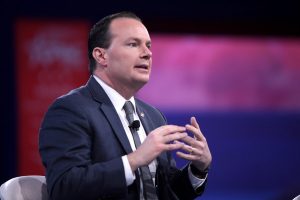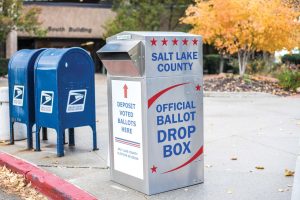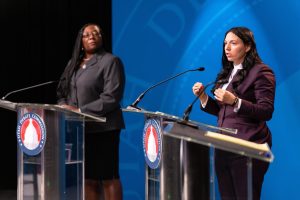Power of Pronouns Event Provides New Perspectives on Pronouns and Identity
Paméla Cappas-Toro speaks at “Reframing the Conversation: The Power of Pronouns” at S.J. Quinney College of Law in Salt Lake City on Oct. 19, 2022. (Photo by Xiangyao “Axe” Tang | The Daily Utah Chronicle)
October 20, 2022
The Equity, Diversity, and Inclusion division at the University of Utah frequently holds events they call “Reframing the Conversation” either via live stream or in person, to address certain topics such as racism, free speech and diversity. The Power of Pronouns session held on Oct. 19 was centered around how pronouns can shape who we are and included the experiences of four different panelists.
Shelby Hearn, coordinator of education and leadership development at the LGBT Resource Center, moderated the event and said that these types of events can help open conversations and provide different perspectives on popular topics.
“Equity, Diversity, [and] Inclusion puts on Reframing the Conversations to bring important topics to campus and offer opportunities for the campus community to be in conversation with folks who are experts or folks who are frequently having these conversations,” Hearn said.

Giving Respect
Rome Aguilar, a sophomore studying political science and economics at the U, started off the conversation by saying that using someone’s pronouns correctly shows that you respect them, something the LGBTQIA+ community needs more of.
“Pronouns for me are still powerful symbols that not only show respect but also an allyship,” Aguilar said. “I think that when people are willing to use the pronouns that I choose for myself, it signifies to me that this person is invested in having productive conversations with me and that they see me as a person.”
Sue Robbins, a transgender advisory council member at Equality Utah, said that her pronouns are a declaration of who she is and that when people use her pronouns correctly, she not only feels respected, but she feels seen.
“Just stating my own pronouns has its own power because it’s an affirmation of the person that I have felt inside of me for so many years that I wasn’t able to let out until much later in life,” Robbins said.
According to Hearn, the normalization of pronouns has been very important for the LGBTQIA+ community and allows people to be themselves and feel welcomed in a community.
“We see this impact that we have on our spaces where folks feel that normalizing sharing pronouns has created a space where they feel free or perhaps safe to enter into far more complex conversations,” Hearn said. “There’s this joy in spaces where pronouns are shared and normalized.”
The Fluidity of Identity
While pronouns are becoming more normalized and accepted, according to Ana Antunes, an assistant professor in the division of gender studies at the U, there are still some misconceptions around pronouns. One of the most common misconceptions, said Antunes during the event, is that some people think they have a choice over the pronouns of others.
“I think one of people’s misunderstandings about pronouns when somebody tells you what their pronouns are is that the listener has any say in whether that’s true or not,” Antunes said. “People feel like they can make choices for people’s identities.”
When asked about how classrooms could become more inclusive, Aguilar said that identities aren’t all cut and dry, and no one person should feel pressured to have their identity fit under a specific label.
“The fundamental approach we should be taking for real inclusivity, especially culture inclusivity, is something where our goal is to try to understand that these identities can be more fluid and more unnamed than they are,” Aguilar said.
Robbins added that people should be allowed and supported to openly experiment with their identity.
“We need to give room for people to not have to embrace certain pronouns, certain terminology, certain boxes,” Robbins said. “Everything is a personal choice that shouldn’t be impacted by everyone else and all the outside influences out there.”
Many students are still figuring out who they are, and while pronouns are important, generally allowing space for people to be who they are is the main way to support students, Robbins said.
“The whole idea is to create space for people to be themselves no matter what they may express back to us,” Robbins said. “It doesn’t matter what it actually is, what matters is that we actually take that and affirm it back to them so they can be themselves.”
s.shaughnessey@dailyutahchronicle.com


















Arleesa • Oct 21, 2022 at 2:14 pm
I don’t choose which pronouns to refer to someone as. I simply adhere to the rules of English grammar.
If someone at an event tells me her pronouns are “they/them/their,” I’m not going to remember this five weeks later when I’m talking about her in her absence. And does she really CARE what that I’m referring to her as a “her” and “she” 200 miles away when she met me only once and likely can’t even remember my name or my face?
Nobody gets to dictate to me how I should change the rules of English grammar. If someone’s pronouns are xe/zhi or whatever, I’m not going to remember this, and to expect people to is just unrealistic especially if they encounter a lot of people in person, via email or wherever “preferred pronouns” can be revealed.